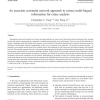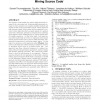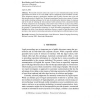352 search results - page 28 / 71 » Automatically Extracting and Representing Collocations for L... |
101
click to vote
DSS
2007
15 years 13 days ago
2007
International crime and terrorism have drawn increasing attention in recent years. Retrieving relevant information from criminal records and suspect communications is important in...
94
Voted
GECCO
2003
Springer
15 years 5 months ago
2003
Springer
The process of labeling each word in a sentence with one of its lexical categories (noun, verb, etc) is called tagging and is a key step in parsing and many other language processi...
108
Voted
SIGSOFT
2009
ACM
15 years 7 months ago
2009
ACM
An objective of unit testing is to achieve high structural coverage of the code under test. Achieving high structural coverage of object-oriented code requires desirable method-ca...
100
click to vote
AIL
2006
15 years 16 days ago
2006
We describe research carried out as part of a text summarisation project for the legal domain for which we use a new XML corpus of judgments of the UK House of Lords. These judgmen...
124
Voted
ICTAI
2006
IEEE
15 years 6 months ago
2006
IEEE
Enterprise corpora contain evidence of what employees work on and therefore can be used to automatically find experts on a given topic. We present a general approach for represen...



